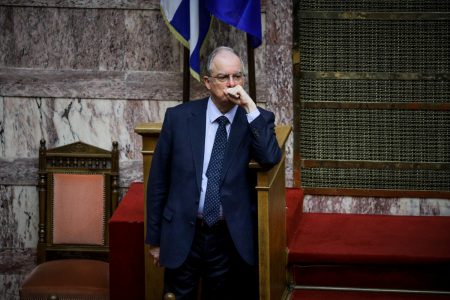In an Athens on a two-day visit for talks with the government, Europe’s Rconomic and Financial Affairs Commissioner, Pierre Moscovici, expresses support for Greek debt relief, and says that while there will be no more memorandums after August, there will be continued close supervision of the Greek economy.
Moscovici and Migration Commisisoner Avramopoulos were received by President Prokopis Pavlopoulos.
The visit comes on heels of revelations that the name of his colleague, Migration Commissioner Dimitris Avramopoulos, appears in the court records of the Novartis kickback scandal. Avramopoulos has said that the file contains completely slanderous allegations, and that he will brief the Commission and other European Institutions.
In an interview with the state-run Athens News Agency, Moscovici said that he wants Greece to become economically “a normal European country once again”, and that the Greek economy will be monitored through a coordination scheme set up in 2010 that includes all EU countries, called the European Semester, but also a “post-programme surveillance”.
“Each year, the Commission undertakes a detailed analysis of each country’s plans for budget, macroeconomic and structural reforms. It then provides EU governments with country-specific recommendations for the next 12-18 months.It also monitors EU countries’ efforts towards the «Europe 2020» targets, the European Semester’s website says.
While supporting debt relief indirectly, by saying that the Greek debt must become sustainable, Moscovici offers no details, or even an outline of the Commission’s proposals.
“The fact that Greece’s public debt stands at almost 180% of GDP remains a problem that must be addressed decisively. My approach, and the Commission’s approach, is to support the discussions underway with one goal – to facilitate an agreement on a credible process to ensure that Greece’s debt is sustainable. Technical work is now underway on a mechanism for debt relief tied to economic growth, an idea that was first proposed last year and supported by the June 2017 Eurogroup statement,” Moscovici said.
The path to normalcy, dual supervision
“What I want is that after the programme, Greece will become, in economic terms, a normal European country once again. Greece’s economic policies will be monitored through the coordination process we call the European Semester. Because many of the programme commitments will continue to be implemented long after the programme ends, there will also need to be an appropriate type of post-programme surveillance in place. But let’s be clear: there will be no more ‘memoranda’ and, provided responsible fiscal policies are pursued in the future, there will be no more need for austerity,” he underlined.
The final sprint
“The next six months constitute the home stretch of the memorandum era, which began almost eight years ago in the spring of 2010. We all know how difficult these years have been for the Greek people. Now, the light can be clearly seen at the end of the tunnel. The swift, smooth and successful conclusion of the third review bodes well for the next steps,” the European Commissioner said.
Moscovici expects that the fourth and final programme review will proceed smoothly, “provided the good constructive spirit that has defined the cooperation over recent months is maintained by all partners”.



